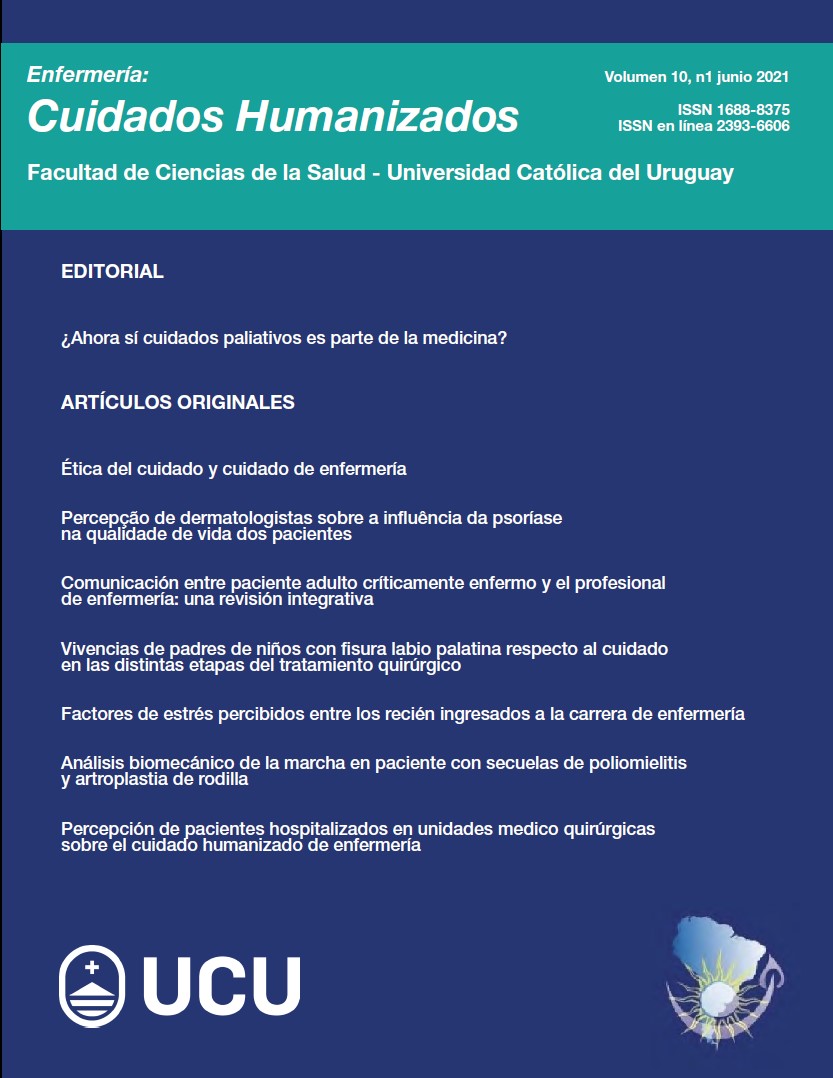Perceived stress factors among newcomers to the nursing career
DOI:
https://doi.org/10.22235/ech.v10i1.2300Keywords:
Nursing Students, Perceived Stress, Education., Mentorship, UniversityAbstract
Objective: To determine the prevalent stress factors among new students to the Faculties of Nursing at the Faculties of Nursing at the Universities of Cadiz, Cordoba, Huelva and Seville, and the influence of socio-demographic, academic, socio-economic, orientation and health factors. Design: A descriptive, observational and cross-sectional study. Methodology: 617 first year nursing students were surveyed (with a 95.66 % response rate) by means of two questionnaires, one for socio-demographics and health, the other for the stress perceived by new students. A descriptive analysis of the stress factors was then carried out for the frequency, mean and standard deviation. The relation between factors was examined through differential analysis by means of the Mann-Whitney U and Kruskal-Wallis non-parametric tests. Results: The situations of greatest anxiety among new undergraduates are “taking examinations” and “the amount of work I have to do”. Consequently, the most stressful factor is “academic stress” whilst the least stressful is “feelings of loneliness”. The students who feel most stress across various factors can be identified as: over 25, women, studying outside their home province, and living in rented accommodation during the academic year. Conclusions: Starting a degree in nursing is a stressful time, and students can find their health, quality of life and academic performance negatively affected. The main determinants of stress among new undergraduates are the joint demands of examinations and workload. It would undoubtedly be enlightening to examine this issue further in order to find the possible causes of the problem and to develop strategies that can help in its prevention and so improve the students’ experience of university.
Downloads
References
Lazarus RS, Folkman S. Stress, appraisal, and coping [Internet]. New York: Springer; 1984. Disponible en: https://books.google.es/books?hl=es&lr=&id=i-ySQQuUpr8C&oi=fnd&pg=PR5&ots=DgDVnofcQh&sig=I8Y6x0MJ9v-VXT0F64-roCv9QF4&redir_esc=y#v=onepage&q&f=false
Van der Riet P, Levett-Jones T, Aquino-Russell C. The effectiveness of mindfulness meditation for nurses and nursing students: An integrated literature review. Nurse Educ Today [en línea]; 2018, 65: 201-211. Disponible en: 10.1016 / j.nedt.2018.03.018
Turner K, McCarthy V. Stress and anxiety among nursing students: a review of intervention strategies in literature between 2009 and 2015. Nurse Educ. Pract [en línea]. 2017; 22: 21-29. Disponible en: 10.1016 / j.nepr.2016.11.002
Rayan A. Mindfulness, Self-Efficacy, and Stress Among Final-Year Nursing Students. J Psychiatr Nurs Ment Health Serv [en línea]. 2019; 57(4): 49-55. Disponible en: 10.3928 / 02793695-20181031-01
Jamieson J, Crum A, Goyer J, Marotta M, Akinola M. Optimizing stress responses with reappraisal and mindset interventions: an integrated model. Anxiety Stress Coping [en línea]. 2018; 31(3): 245-261. Disponible en: 10.1080 / 10615806.2018.1442615
Ramírez L, Pérez-Padilla E, García-Oscos F, Salgado H, Atzori M, Pineda J. A new theory of depression based on the serotonin/kynurenine relationship and the hypothalamicpituitary-adrenal axis. Biomédica [en línea]. 2018; 38: 437-50. Disponible en: 10.7705/biomedica.v38i3.3688
Brosschot J, Verkuil B, Thayer J. Generalized Unsafety Theory of Stress: Unsafe Environments and Conditions, and the Default Stress Response. Int J Environ Res Public Health [en línea]. 2018; 15(3):464. Disponible en: 10.3390 / ijerph15030464
Brosschot J, Verkuil B, Thayer J. The default response to uncertainty and the importance of perceived safety in anxiety and stress: An evolution-theoretical perspective. J. Anxiety Disorders [en línea]. 2016; 41: 22-34. Disponible en: 10.1016 / j.janxdis.2016.04.012
Brosschot J, Verkuil B, Thayer J. Exposed to events that never happen: Generalized unsafety, the default stress response, and prolonged autonomic activity. Neurosci Biobehav Rev [en línea]. 2017; 74: 287-296. Disponible en: 10.1016 / j.neubiorev.2016.07.019
Brandy J, Kessler T, Grabarek C. A Grounded Theory Investigation into Sophomore Students' Recall of Depression during their Freshman Year in College: A Pilot Study. J Psychiatr Nurs Ment Health Serv [en línea]. 2018; 56(9): 44-50. Disponible en: 10.3928 / 02793695-20180329-02
Griggs S, Crawford S. Hope, Core Self-Evaluations, Emotional Well-Being, Health-Risk Behaviors, and Academic Performance in University Freshmen. J Psychiatr Nurs Ment Health Serv [en línea]. 2017; 55(9): 33-42. Disponible en: 10.3928/02793695-20170818-11
Salavarani V, Ardenghi S, Rampoldi G, Bani M, Cannata P, Ausili D, Di Mauro S, Strepparava M. Predictors of psychological distress amongst nursing students: A multicenter cross-sectional study. Nurse Educ Pract [en línea]. 2020; 44: 102758. Disponible en: 10.1016 / j.nepr.2020.102758
Cabanach R, Souto-Gestal A, Franco V. Escala de Estresores Académicos para la evaluación de los estresores académicos en estudiantes universitarios. Rev. Iberoam. de Psicol. y Salud [en línea]. 2016; 7(2):41-50. Disponible en: 10.1016/j.rips.2016.05.001
Lyman , B, Gunn, M, Mendon, C. New graduate registered nurses’ experiences with psychological safety. J. Nurs. Manag [en línea]. 2020; 28: 831-839. Disponible en: 10.1111 / jonm.13006
McLuckie A, Matheson K, Landers A, Landine J, Novlck J, Barrett T. The Relationship between Psychological Distress and Perception of Emotional Support in Medical Students and Residents and Implications for Educational Institutions. Acad Psychiatry [en línea]. 2018; 42(4): 1-7. Disponible en: 10.1007 / s40596-017-0800-7
House D, Hallman M. Telephone Simulation: An Intradisciplinary Simulation for Nursing Education. J Nurs Educ [en línea]. 2020; 59(1): 57. Disponible en: https://doi.org/10.3928/01484834-20191223-14
George T, Gainey K, Kershner S, Weaver D, Hucks J. Junior and Senior Nursing Students: A Near-Peer Simulation Experience. J Nurs Educ [en línea]. 2020; 59 (1): 54-56. Disponible en: 10.3928 / 01484834-20191223-13
Hughes M, Kenmir A, Innis J, O'Connell J, Henry K. Exploring the Transitional Experience of First-Year Undergraduate Nursing Students. J Nurs Educ [en línea]. 2020; 59 (5): 263-268. Disponible en: 10.3928 / 01484834-20200422-05
Griggs S. Hope and Mental Health in Young Adult College Students: An Integrative Review J Psychiatr Nurs Ment Health Serv [en línea]. 2017; 55(2): 28-35. Disponible en: 10.3928 / 02793695-20170210-04
Green C. Teaching accelerated nursing students’ selfcare: A pilot Project. Nurs. Open [en línea]. 2020; 7: 225–234. Disponible en: 10.1002/nop2.384
Snyder B. Practicing What We Preach: Teaching Psychiatric–Mental Health Student Nurses to Care For Themselves. J Psychiatr Nurs Ment Health Serv [en línea]. 2020; 58(6): 40-45. Disponible en: 10.3928 / 02793695-20200406-02
Iglesias Parra M. Estudio del estrés percibido por alumnos noveles de ciencias de la salud [Tesis doctoral]. Málaga: Facultad de Enfermería, Fisioterapia, Podología y Terapia Ocupacional de Universidad de Málaga; 2011. Disponible en: https://riuma.uma.es/xmlui/bitstream/handle/10630/4906/TDR%20IGLESIA%20PARRA.pdf?sequence=1
Rodríguez García B, Arenal Gota T, Vega Martínez MC, Blanco Montagut LE. Prevalencia de estresores académicos en estudiantes de grado en Enfermería. Metas de Enfermería [Internet]. 2018; 21(4): 49-54. Disponible en: http://search.ebscohost.com/login.aspx?direct=true&db=ccm&AN=129665127&lang=es&site=ehost-live
Gurková E, Zeleníková R. Nursing students’ perceived stress, coping strategies, health and supervisory approaches in clinical practice: A Slovak and Czech perspective. Nurse Educ Today [en línea]. 2018; 65(1): 4-10. Disponible en: 10.1016 / j.nedt.2018.02.023
Suen W, Um S, Wang W, Kowitlawakul Y. Stressors and expectations of undergraduate nursing students during clinical practice in Singapore. Int J Nurs Pract [en línea]. 2016; 22(6): 574-83. Disponible en: 10.1111 / ijn.12473
Simnonelli-Muñoz A, Balanza S, Rivera-Caravaca J, Vera-Catalán T, Lorente A, Gallego-Gómez J. Reliability and validity of the student stress inventory-stress manifestations questionnaire and its association with personal and academic factors in university students. Nurse Educ Today [en línea]. 2018; 64: 156-60. Disponible en: 10.1016 / j.nedt.2018.02.019
Rodríguez B, Labrador M, Blanco L. Estresores académicos percibidos por estudiantes pertenecientes al Grado en Enfermería de la Escuela de Enfermería y Fisioterapia de la Universidad de Salamanca. Revista enfermeríacyl [en línea]. 2016; 8(2): 23-32. Disponible en: http://www.revistaenfermeriacyl.com/index.php/revistaenfermeriacyl/article/view/173
Downloads
Published
How to Cite
Issue
Section
License
Copyright (c) 2021 Enfermería: Cuidados Humanizados

This work is licensed under a Creative Commons Attribution 4.0 International License.

















